ZEN IRODALOM ZEN LITERATURE
« Zen főoldal
« vissza a Terebess Online nyitólapjára
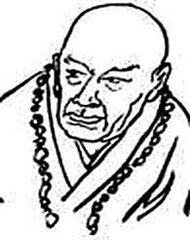
南嶽明瓚 Nanyue Mingzan* (8th c.)
樂道歌 Ledao ge
*aka Lancan
懶殘 / Lanzan 懶瓚, or “Lazy Zan”
(Rōmaji:) Nangaku Myōsan (Raisan): Rakudō-ka
(English:) Song of Enjoying the Way
(Magyar:) Nanjüe Mingcan: Az Út örömei
Tartalom |
Contents |
Lusta Zan verse Nanjüe Mingcan: Az Út örömei (részlet) Jeff Shore
|
A Taste of Zen 南嶽明瓚 Nanyue Mingzan: 樂道歌 Ledao ge |
The poem entitled Ledao ge 樂道歌 (Song of enjoying the Way) by Nanyue Mingzan 南嶽明瓚 (n.d.), found in both the jc and zj 3: “When I want to go I simply go / When I want to stay I simply stay” (t 51: 461b). The Ledao ge seems to have been widely known. It is quoted in its entirety in zj 3, as w ell as in the jc (t 51: 461b–c). Of Nanyue Mingzan himself little is known. He joined the assembly of Puji 普寂 (651–739), second patriarch of the Northern school of Chan, who was teach-ing on Mount Song 嵩, not far from the city of Luoyang 洛陽, and became one of Puji's heirs. Later Mingzan lived in a hut on Mount Nanyue 南嶽 in southeastern Hunan. There he was known as Lanzan 懶贊. A short biography is found in the xg (t 50: 834a–b); zj 3 mentions him as an heir of Puji. Mingzan appears in an episode related by Yuanwu Keqin in his comment on the verse in bl case 34:
Lanzan lived in seclusion in a stone cave on Mount Heng 衡 [i.e., Nanyue]. Emperor Dezong 德宗 [r. 779–805] heard his name and dispatched a messenger to summon him to the court. When the messenger reached the cave he announced the command of the Son of Heaven, then said, “Your Reverence should rise and acknowledge the Imperial Benevolence.” Zan, who at the time was poking a fire of cow-dung, pulled out a roasted root and began to eat. As it was wintertime, mucous was dripping down onto his chin, and he made no answer. The messenger laughed and said, “May I suggest that Your Reverence wipe the mucous away?” “Why should I go to that bother for a common man?” Zan replied. In the end he did not rise. The messenger returned and reported to the throne. Dezong was filled with admiration. (t 48: 173b)
(The Record of Linji, / translation and commentary by Ruth Fuller Sasaki; edited by Thomas Yuho Kirchner. Honolulu, 2009. p. 142.)
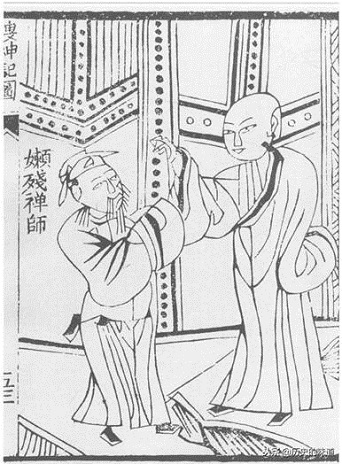
懶殘禪師
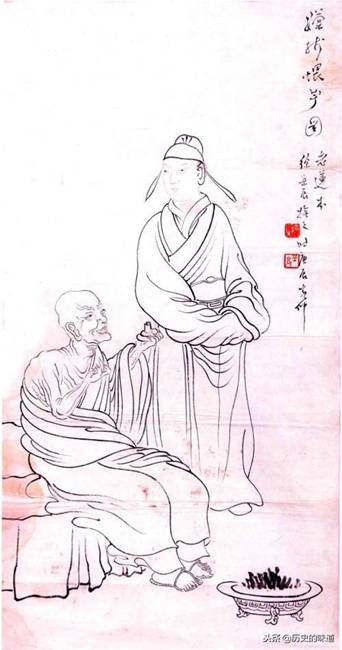
懶殘煨芋圖
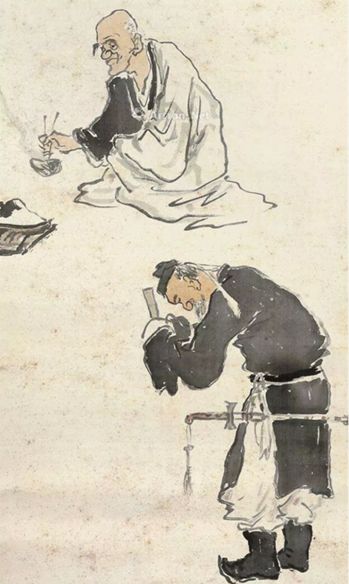
Present-day Chinese painting
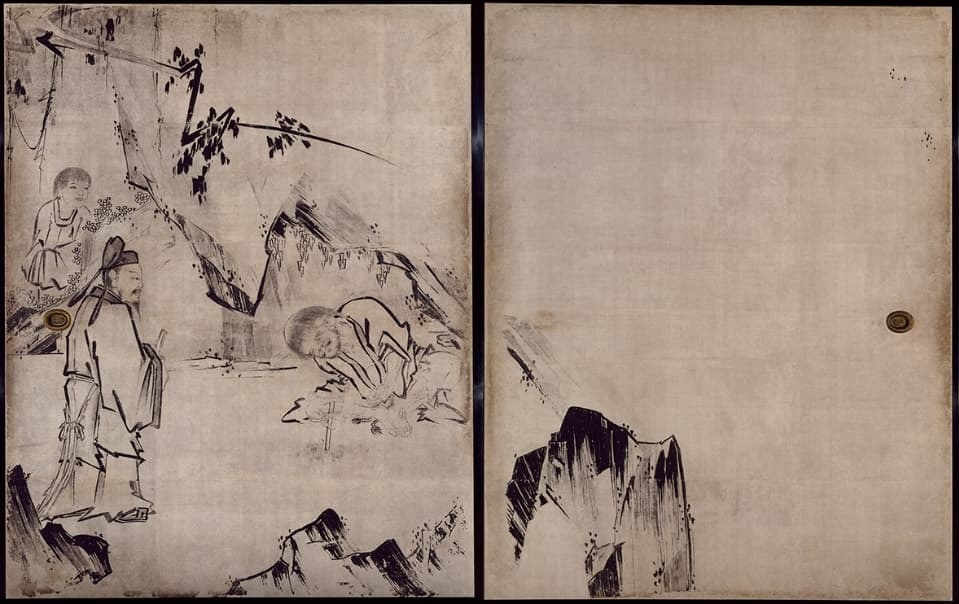
懶殘煨芋圖
長谷川等伯 Hasegawa Tōhaku (1539-1610)
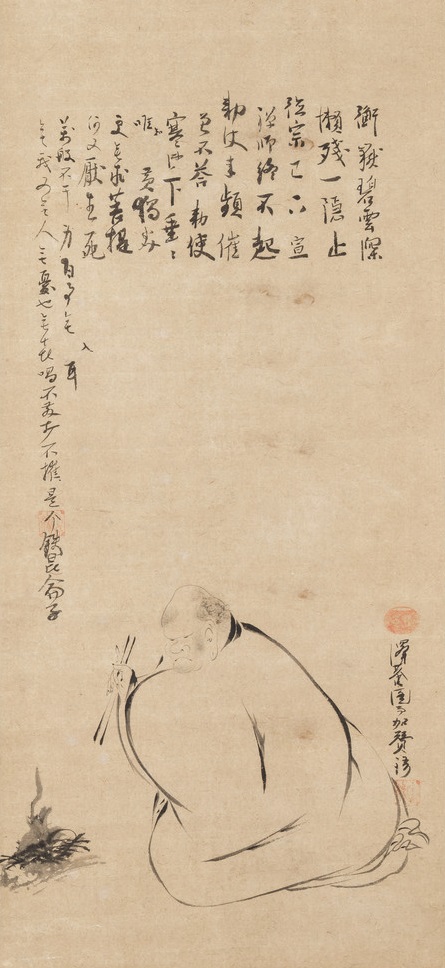
Monk Raisan Baking Sweet Potatoes
Alternate Title: 懶さん芋をやく
by Takuan Sōhō (1573-1645)
Hanging scroll; ink on paper, 66.7 x 30.5 cm
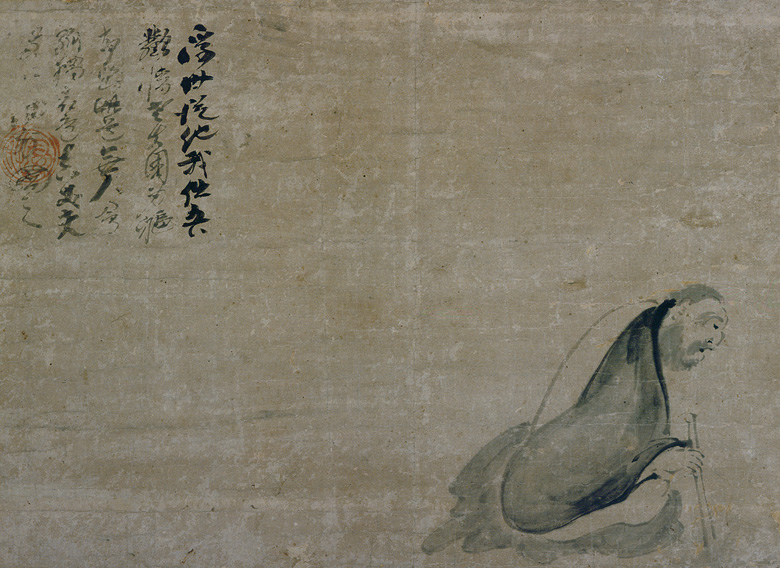
Lazy San, the potato monk
by Fūgai Ekun
Hanging scroll, ink on paper
32.7 x 44.0 cm
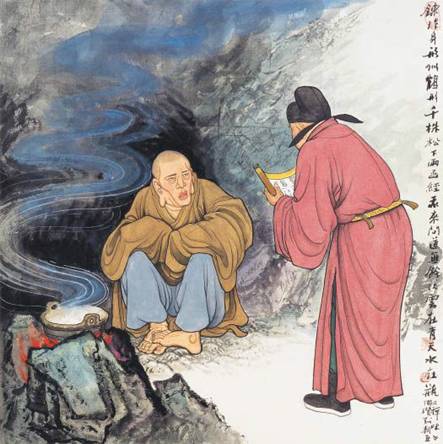
A TASTE OF CHAN
In: 禅画禅语 Chan Heart, Chan Art
by 星雲 Xing Yun (Venerable Master Hsing Yun)
Translated and edited by Pey-Rong Lee and Dana Dunlap
Painting by 高尔泰/高爾泰 Gao Ertai & 蒲小雨 Pu Xiaoyu
During the Tang Dynasty, there was a Chan Master Lanzan
who lived in seclusion in a cave on Mt. Nanyue in Hunan
Province. He once wrote a poem expressing his state of mind:
Worldly affairs pass slowly by,
Incomparable to the mountains and hills,
Lying under wisteria vines,
With a stone for my pillow.
No audience with the Son of Heaven,
Why envy princes and nobles?
No worries about life and death,
What further distress could there be?
The meaning of this poem explained his carefree life.
Afterwards, when the poem reached the ears of the Tang Emperor
Dezong, Dezong very much wanted to meet this Chan Master and
see what kind of person he was. Therefore, he dispatched an official
to welcome the Chan Master to the imperial court.
The official, carrying the imperial decree, found the cave just
in time to see the Chan Master cooking inside the cave. At the
mouth of the cave, the official then cried out loudly, “The imperial
decree has arrived. Quick! Kneel down to receive it!” Inside the
cave, Chan Master Lanzan, pretending to be deaf and dumb, did
not pay him the slightest bit of attention.
The official poked his head in and only saw the Chan Master
using cow dung to stoke the fire. Roasting in a clay pot were sweet
potatoes. The fire burned more and more intensely, smoke
permeated everywhere, and black fog swirled around and around
completely engulfing the inside and outside of the cave. Smoke
assailed the Chan Master, causing tears and mucus to run down his
face. Seeing this, the attending guard could not help but call out,
“Hey Chan Master! Snot is dripping down your nose! Why don’t
you wipe it off?”
Chan Master Lanzan, without even turning his head, replied,
“I don’t have the time to clean off snot for ordinary people!”
After Chan Master Lanzan said this, he immediately picked
up a piping hot sweet potato, put it in his mouth, and said again
and again in praise, “Delicious! Delicious!”
Seeing this, the official was stunned speechless because what
Chan Master Lanzan was actually eating was one rock after another.
While Chan Master Lanzan was eating, he casually picked up two
more and handed them to the official, saying, “Please eat them
while they’re hot! The three realms are only of the mind; the
myriad dharmas are only of the consciousness. Poor and rich,
noble and mean, raw and cooked, soft and hard—in the ground of
the mind and the ocean of consciousness, do not separate them into
two.”
The official, seeing the Chan Master’s unusual behavior and
hearing his inscrutable Dharma teaching, did not dare answer, so
he hurried back to the imperial court and faithfully reported to the
emperor. After listening to this, Emperor Dezong sighed with great
emotion and said, “That our country has such a Chan master is
truly everyone’s blessing!”
Among monastics, there are bhiksus of the people and there
are also bhiksus who live in seclusion. The bhiksus of the people
propagate the Dharma to benefit sentient beings and serve society.
The bhiksus living in seclusion in caves deep in the mountains
tranquilly cultivate the Way. Some bhiksus living among people
are in the mundane world, but their minds are in the mountain
forests. Some bhiksus living in seclusion are in a place of
practice, but their minds are in the secular world. Like Chan
Master Lanzan, when he met with the favor of the emperor, he
looked upon it as a summons from Yama, the King of Hell; when
rewarded with treasures, he regarded them as burdens. He truly
is a sagely monastic who transcended the human world.
Enjoying the Way
attributed to Nanyue Mingzan
Translated by Jeff Shore
http://beingwithoutself.files.wordpress.com/2011/07/enjoyingtheway.pdf
I
1. Serenely carefree, nothing to change;
2. Carefree, what need for words?
3. Real mind doesn’t scatter,
4. So no need to stop worldly cares.
5. The past is already past,
6. The future can’t be reckoned.
7. Sitting serenely carefree,
8. Why would anyone pay a call?
9. Seeking to work on things outside –
10. It’s all foolishness!II
11. As for provisions, not one grain;
12. If a meal is offered, just gobble it up.
13. Worldly folk full of needless care,
14. Always chasing, they never get it.III
15. I neither desire heavenly realms,
16. Nor want blessings in this world.
17. When hungry, eat;
18. Tired, sleep.
19. Fools laugh at me,
20. But the wise know its wisdom.
21. It’s not being stupid –
22. It’s what we originally are.IV
23. When you have to go, go;
24. When you have to stay, stay.
25. Over shoulders, a ragged robe;
26. Below, bare feet.
27. Talking, talking, more and more –
28. Always leads to mistakes.
29. If you want to save others,
30. Better work on saving yourself!V
31. Don’t rashly seek the true Buddha;
32. True Buddha can’t be found.
33. Does marvelous nature and spirit
34. Need tempering or refinement?
35. Mind is this mind carefree;
36. This face, the face at birth.
37. Even if the kalpa-rock is moved,
38. It alone remains unchanged.VI
39. Carefree is just that –
40. What need to read the words?
41. With the root of delusive self gone,
42. All falls into place right where it is.VII
43. Rather than get worn out over this and that,
44. In the woods, serene, just take a nap.
45. Raise your head and the sun’s already high;
46. Scrounge for food, then wolf it down.VIII
47. Intent on getting good results,
48. You merely fall deeper into ignorance.
49. Try to grasp, it can’t be gotten;
50. Let go and there it is.IX
51. I have one “word”;
52. With it, all concepts and relations gone.
53. Clever explanations cannot get at this,
54. Only mind conveys it.X
55. Again this single “word,”
56. Directly expressed without medium.
57. Smaller than small,
58. Originally without direction or place.
59. Originally whole and complete –
60. Not something strung together with effort.XI
61. Lost in worldly cares
62. Is far from mountain stillness.
63. Where pines obscure sunlight,
64. Clear green streams flow on and on.
65. Lying down beneath wisteria vines,
66. Head pillowed on smooth stone.
67. With mountain clouds as curtain
68. And night moon as a hook.
69. Not rising for the emperor,
70. Why envy royalty?
71. Not even birth-death concerns me –
72. What remains to grieve over?XII
73. Moon reflected in water has no fixed form;
74. That’s the way I always am.
75. Each and every thing as it is,
76. Originally unborn.
77. Sitting serenely carefree:
78. Spring comes, the grass grows green of itself.
Lusta Zan verse
Nanyue Mingzan
Nanyue-beli Lusta Zan tisztelendő verse
(Nanyue Lanzan heshang ge) / (Ledao ge)
Fordítás: Hadházi Zsolt
http://zen.gportal.hu/gindex.php?pg=4792614&nid=6499318
Teljesen gondtalanul nincs min változtatni,
Gondtalanul mit kéne magyarázni?
Az igaz tudat nem szétszórt,
A gondtól nem kell elvágni.
A múlt már elmúlt,
A jövőt nem lehet kiszámítani.
Teljesen gondtalanul ülök,
Hívtam én valaha bárkit is?
Kívül keresni teendőt
Mindig hülyeség.
Élelemből nincs egy szem se,
Ha ételre bukkanok, csak megeszem.
Világi gondterhelt emberek,
Egymáson átgázolva sikertelenek.
Nem örülök a mennyei születésnek,
És nem szeretem az érdemmezőket.
Ha éhes vagyok, eszem,
Ha álmos vagyok, alszom.
Az ostobák nevetnek rajtam,
De a bölcsek értik.
Ez nem hülyeség,
Ilyen az eredeti természetünk.
Ha menni kell, megyek,
Ha maradni kell, maradok.
Vállaimon egy darab ruha,
Lábam anyaszült meztelen.
Beszélni és még többet beszélni
A hibák forrása.
Ha meg akarod menteni a lényeket,
Inkább mentsd meg magad.
Ne a valódi buddhát keresd,
A valódi buddhát nem lehet meglátni.
A csodás természetet, a szellemet,
Valaha is csiszolták vagy edzették?
A tudat a gondtalan tudat,
Az arc az anyaszült arc.
Ha a kalpa-kő elmozdul,
Ez akkor sem változik.
A gondtalan eredetileg gondtalan,
Nem kell szavakat olvasni.
Eltávolítva az ént gyökerestől,
Minden magától egyetértésben van.
Mindenféle munkával erőlködni
Nem olyan, mint az erdőben szunyókálni.
Felemelem fejem és látom a nap magasan van,
Ételt koldulok, majd befalom.
Jó eredményeket akarni
Mély tévedésbe zuhanás.
Megragadnád, de megfoghatatlan,
Nem megragadva magától itt van.
Van egy szavam,
Elvágja a fogalmakat, elhagyja a feltételeket.
Ügyes magyarázat meg nem foghatja,
Egyedül a tudat adja át.
Továbbá, ez az egy szó
Közvetítés nélkül, egyenesen adatik.
Apró, mint a hajszál hegye,
Eredendően irány és hely nélküli.
Eredendően teljes és tökéletes,
Nem munkával összefont.
Belefeledkezni a világi gondokba
Nem fogható a hegyekhez.
Zöld fenyők takarják el a napot,
Kék patakok hosszan folynak.
Lefekszem az akác alá,
Egy darab kő a párnám.
Hegyek felhői a függönyöm,
Éji hold az akasztóm.
Nem kelek fel a császárnak,
Minek irigyelni az uraságokat?
Születés és halál nem foglalkoztat,
Min kéne még aggódnom?
Holdnak a vízen nincs teste,
Én mindig csak akképp vagyok.
A tízezer dolog mind olyan,
Eredendően nem született.
Teljesen gondtalanul ülök,
Jön a tavasz és a fű magától zöld.
Nanjüe Mingcan: Az Út örömei (részlet)
Fordította: Terebess Gábor
Ha megéhezel, edd meg a rizsed;
ha elálmosodsz, hunyd be a szemed.
Bár a bolondok majd kinevetnek,
elég ha a bölcsek értenek meg.